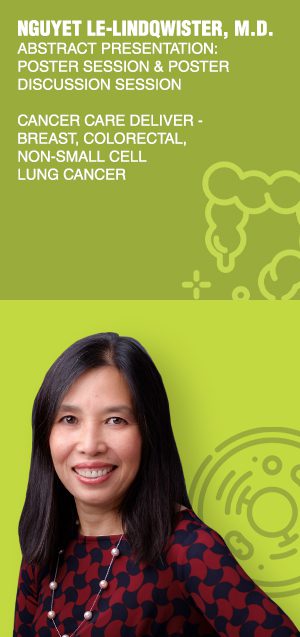Illinois CancerCare Featured at ASCO 2022

June 3 – 7, 2022 | The American Society of Clinical Oncology (ASCO) hosts its 2022 ASCO Annual Meeting in Chicago, IL. ASCO is the world’s leading professional organization of physicians and oncology professionals dedicated to conquering cancer through research, education, and quality patient care. Over 40,000 health professionals from around the world attend this annual meeting, both in person and virtually, to review and discuss cutting-edge cancer research, life-changing therapies, and state-of-the-art treatments.
Each year thousands of research abstracts are submitted with high hopes of being featured during this prestigious conference. Abstracts (a short summary of research) of superior quality are selected by the ASCO Scientific Program Committee for presentation at the Annual Meeting and for publication in the ASCO Annual Meeting Proceedings, a supplement to the Journal of Clinical Oncology.
We are excited to share Illinois CancerCare has FOUR research abstracts selected for this year’s meeting!
GREGORY GERSTNER, M.D.
Abstract Presentation: Poster Presentations (2)
Lung Cancer – Metastatic Non-Small Cell Lung Cancer
- A phase 2 study of an off-the-shelf, multi-neoantigen vector (ADXS-503) in patients with metastatic non–small cell lung cancer either progressing on prior pembrolizumab or in the first-line setting // Download
-
Immunogenicity and disease control induced by a multineoantigen vaccine (ADXS-503) in patients with metastatic non–small cell lung cancer who have progressed on pembrolizumab. // Download
PURPOSE:
This clinical trial evaluates ADXS-503, a new possible immunotherapy treatment for advanced non-small cell lung cancer (NSCLC) following disease progression. In part B and C of this trial, ADXS-503 is administered in combination with another immunotherapy drug – Pembrolizumab. ADXS-503 and Pembrolizumab work in different ways to enhance the immune system’s ability to recognize and attack cancer cells. This phase 1/2 research trial evaluates the overall safety and effectiveness of this treatment combination by learning how these drugs work together in the body.
PRIMARY FINDINGS:
The addition of ADX-503 to Pembrolizumab was well tolerated by study participants. The results show that this new treatment regimen has the ability to further activate our body’s immune system to identify and attack the cancer cells – reducing the amount of cancer within the body and/or preventing it from worsening. Enrollment to this trial continues as researchers explore additional benefits of this treatment regimen for advanced lung cancer patients.
WHY IS THIS RESEARCH IMPORTANT?
Immunotherapy has been one of the biggest breakthroughs in oncology in the past decade. It has transformed our care for our patients. One of the many remaining obstacles, however, is when patients develop resistance to these treatments. This trial, using a bio-engineered bacteria, has shown that patients can achieve renewed responses by getting their immune systems to better recognize and attack the cancer cells. We’re excited that this could represent one of the first treatments for patients with relapsed disease following initial immunotherapy and very excited to be able to offer it to our patients in Central Illinois.
NGUYET LE-LINDQWISTER, M.D.
Abstract Presentation: Poster Session & Poster Discussion Session
Cancer Care Delivery – Breast, Colorectal, Non-Small Cell Lung Cancer
- A pragmatic cluster-randomized trial of a standing physician order entry intervention for colony stimulating factor use among patients at intermediate risk for febrile neutropenia (SWOG S1415CD) // Download
- A pragmatic cluster-randomized trial of computerized clinical decision support system to improve colony stimulating factor prescribing for patients with cancer receiving myelosuppressive chemotherapy (SWOG S1415CD) // Download
PURPOSE:
This year, more than 250,000 newly diagnosed breast, colorectal, and lung cancer patients will be offered chemotherapy as a part of their initial cancer treatment. A large portion of these patients will be at risk of experiencing a side effect of their chemotherapy treatment called febrile neutropenia (FN). Febrile neutropenia is a serious condition that involves a fever and an abnormally low number of neutrophils, a type of white blood cell that helps fight infection. Medications called colony stimulating factors (CSF) are often given to patients receiving chemotherapy to help prevent or treat febrile neutropenia.
Early research showed that many doctors across the country were not prescribing CSFs according to nationally set guidelines. Underuse of CSFs can increase a patient’s risk of developing febrile neutropenia while overuse (use of the drug when it is not needed) can lead to unnecessary side effects and additional cost, while not providing a benefit. Clinical research trial S1415CD evaluated if an automated system could help doctors more accurately prescribe CSFs compared to standard methods. The automated system prescribes a CSF when a patient is at high risk for developing febrile neutropenia and alerts the doctor not to prescribe the medication for patients at low risk. Physicians were given the option to prescribe or not prescribe CSFs for patients at moderate risk for developing febrile neutropenia. During the trial, physicians were able to override the automated system at anytime to ensure their patients received the care they felt was most appropriate.
PRIMARY FINDINGS:
Implementation of the automated system significantly increased the use of CSF medications for patients at moderate risk for developing febrile neutropenia. However, data shows that the increased use of CSFs did not reduce the occurrence of febrile neutropenia for this risk group. CSF use in the high and low risk patient groups was not impacted by automated system. Overall, the study concludes that use of an automated system for prescribing CSFs and the use of CSF drugs for moderate risk patients was not necessary or beneficial for newly diagnosed breast, colorectal , and lung cancer patients undergoing chemotherapy.
WHY IS THIS RESEARCH IMPORTANT?
Cancer Care Delivery Research trials such as S1415CD focus on addressing roadblocks or challenges that may prevent patients receiving the highest level of care and achieving their best outcome. Although the automated prescribing system did not prove to be beneficial for patients, this trial showed that CSF drugs are not needed to prevent febrile neutropenia for patients at moderate risk. This means less medications for these patients, avoiding possible drug related side effects and additional healthcare costs.





